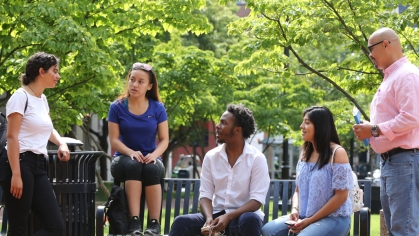Dear Members of the Rutgers Community,
The presidential election has raised pressing questions about the status of immigrants and their families at universities across the nation. These questions touch many members of our community, and I thank all who have encouraged robust and healthy dialogue to address them over the last month.
I write today in response to a number of recent inquiries seeking clarification of the University’s position on protecting the rights both of undocumented students in our community and of the entire student population at Rutgers. This communication brings together in one place the key positions of the University in this important area.
Rutgers has taken a leading position in support of maintaining privacy for our students, advocating for the continuation of Deferred Action for Childhood Arrivals, and ensuring that we continue to provide a safe place for all students to live and learn.
Some have called for the use of specific descriptive designations regarding our position. However, in today’s political environment, terms such as “sanctuary campus” have no legal meaning and are encumbered by vague and shifting definitions and political connections. At Rutgers, we must be focused on policy and principles, not labels. But make no mistake: by providing a safe haven for our students, regardless of nationality or background, Rutgers is and will always be a sanctuary that supports and enables their education, intellectual growth, and personal well-being.
Below are the policies that are now in place regarding questions of immigration and undocumented students at Rutgers:
Rutgers University will continue to steadfastly protect the privacy of all our students and their records. Rutgers does not and will not share undocumented student records without a warrant, subpoena, or court order. We expect all persons associated with the University to protect student privacy and confidentiality as well. Furthermore, Rutgers University will insist that any engagement with Immigration and Customs Enforcement on our campus follow due legal process, including requiring a warrant where appropriate.
Rutgers University will continue to vigorously advocate for the continuation of Deferred Action for Childhood Arrivals policy. As president, I have publicly co-signed a letter through the AAU supporting the continuation of this policy. In New Jersey, undocumented students who graduate from New Jersey high schools receive in-state tuition by the state’s Dream Act, not by federal law. The University also strongly supported this legislation and will strenuously oppose any efforts to rescind it.
Rutgers University police do not inquire into nor record the immigration status of students or other persons unless a serious crime has been committed. Rutgers University does not use E-verify for any purposes other than to comply with longstanding federal law regarding employment eligibility. Immigration status is not a factor in student housing decisions.
All Rutgers students, regardless of their location, have access to the services of our Immigrant Rights Clinic, run by our law school faculty. The Clinic can provide confidential guidance on questions regarding immigration law. Students who feel anxious or upset may always seek assistance from counseling professionals at the student health services locations across the University.
I look forward to our continued dialogue on this important topic. These issues are likely to shift over the coming months, and Rutgers will remain proactive in ensuring that we are supportive of student needs. Thanks again to all who have raised questions and fostered conversation over the past several weeks.
Sincerely,
Robert Barchi


